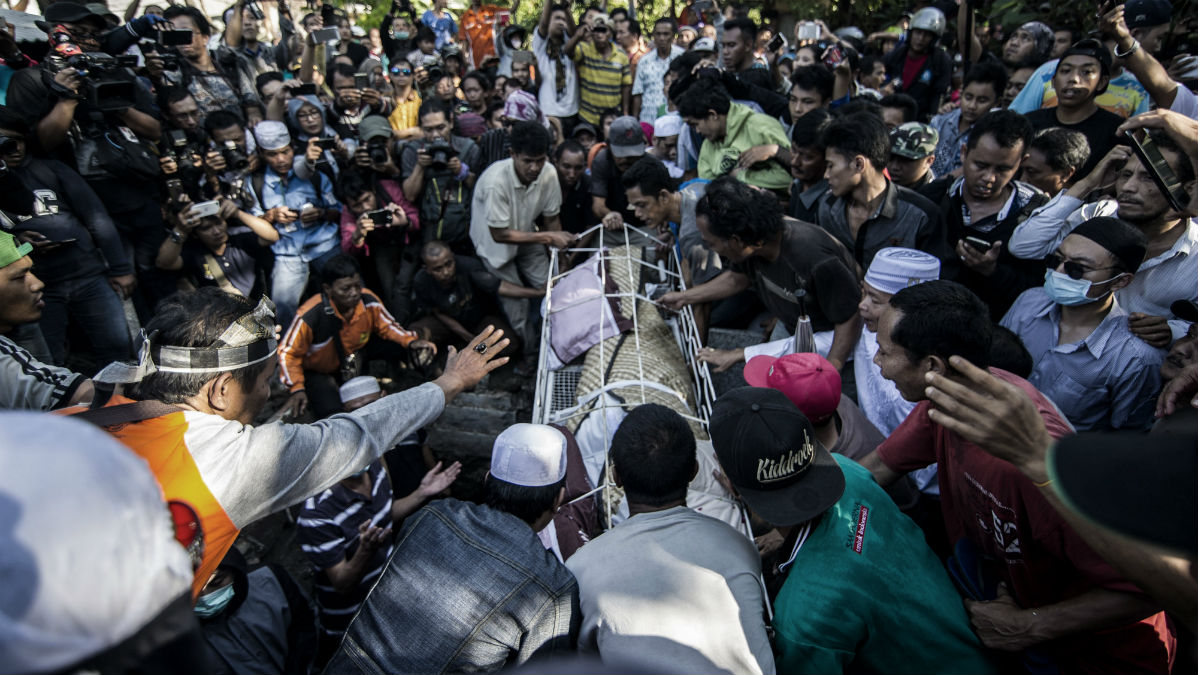Indonesia ignores appeals and executes four drug convicts
One Indonesian and three Nigerians killed by firing squad

A free daily email with the biggest news stories of the day – and the best features from TheWeek.com
You are now subscribed
Your newsletter sign-up was successful
Indonesia has executed four drug convicts, despite continuing criticism of the country’s harsh anti-drugs laws.
One Indonesian man and three Nigerians were killed by firing squad at the Nusakambangan prison island just after midnight local time.
Another 10 convicts, also convicted of drug-related offences, had a last-minute stay of execution but still face the death penalty.
The Week
Escape your echo chamber. Get the facts behind the news, plus analysis from multiple perspectives.

Sign up for The Week's Free Newsletters
From our morning news briefing to a weekly Good News Newsletter, get the best of The Week delivered directly to your inbox.
From our morning news briefing to a weekly Good News Newsletter, get the best of The Week delivered directly to your inbox.
Indonesia is one of 33 countries worldwide that use the death penalty for drug offences. It "has some of the world’s toughest drug laws," says BBC News, "and has faced intense criticism internationally for resuming executions."
The UN announced last year that executions for drug crimes amount to a violation of international law. Among Indonesia's most vocal critics is Amnesty International, which says the country is holding 165 on death row - more than 40 per cent for drug-related crimes.
But Indonesia refuses to yield in the face of condemnation. Its Attorney General, quoted in the Wall Street Journal, said "Whether we accept it or not, it’s a matter of rule of law" - a line upheld earlier in the week by a Foreign Ministry spokesman. Indonesian prosecutors always stress that only convicts who have exhausted all legal avenues are put on the execution list, CNN notes.
In fact, despite its draconian approach to drug smuggling and trafficking, Indonesia had executed relatively few prisoners in recent years, reports the New York Times, "despite having dozens of convicts on death row."
A free daily email with the biggest news stories of the day – and the best features from TheWeek.com
That changed when Joko Widodo became president in October 2014. He declared that the country was facing a "drugs emergency" and rejected clemency appeals from more than 60 death row inmates.
Less than a year later, in April 2015, Indonesia caused diplomatic outrage when it executed 14 drug convicts, including two Australians and one Dutch citizen. Protests prompted President Widodo to tell countries like Australia and the Netherlands not to interfere with Indonesian sovereignty.
The president's office cites figures that drugs are killing at least 40 people a day, but "several international experts have questioned the methodology used to arrive at those statistics," Reuters says.
-
 Is Andrew’s arrest the end for the monarchy?
Is Andrew’s arrest the end for the monarchy?Today's Big Question The King has distanced the Royal Family from his disgraced brother but a ‘fit of revolutionary disgust’ could still wipe them out
-
 Quiz of The Week: 14 – 20 February
Quiz of The Week: 14 – 20 FebruaryQuiz Have you been paying attention to The Week’s news?
-
 The Week Unwrapped: Do the Freemasons have too much sway in the police force?
The Week Unwrapped: Do the Freemasons have too much sway in the police force?Podcast Plus, what does the growing popularity of prediction markets mean for the future? And why are UK film and TV workers struggling?
-
 Epstein files topple law CEO, roil UK government
Epstein files topple law CEO, roil UK governmentSpeed Read Peter Mandelson, Britain’s former ambassador to the US, is caught up in the scandal
-
 Iran and US prepare to meet after skirmishes
Iran and US prepare to meet after skirmishesSpeed Read The incident comes amid heightened tensions in the Middle East
-
 Israel retrieves final hostage’s body from Gaza
Israel retrieves final hostage’s body from GazaSpeed Read The 24-year-old police officer was killed during the initial Hamas attack
-
 China’s Xi targets top general in growing purge
China’s Xi targets top general in growing purgeSpeed Read Zhang Youxia is being investigated over ‘grave violations’ of the law
-
 Panama and Canada are negotiating over a crucial copper mine
Panama and Canada are negotiating over a crucial copper mineIn the Spotlight Panama is set to make a final decision on the mine this summer
-
 Why Greenland’s natural resources are nearly impossible to mine
Why Greenland’s natural resources are nearly impossible to mineThe Explainer The country’s natural landscape makes the task extremely difficult
-
 Iran cuts internet as protests escalate
Iran cuts internet as protests escalateSpeed Reada Government buildings across the country have been set on fire
-
 US nabs ‘shadow’ tanker claimed by Russia
US nabs ‘shadow’ tanker claimed by RussiaSpeed Read The ship was one of two vessels seized by the US military